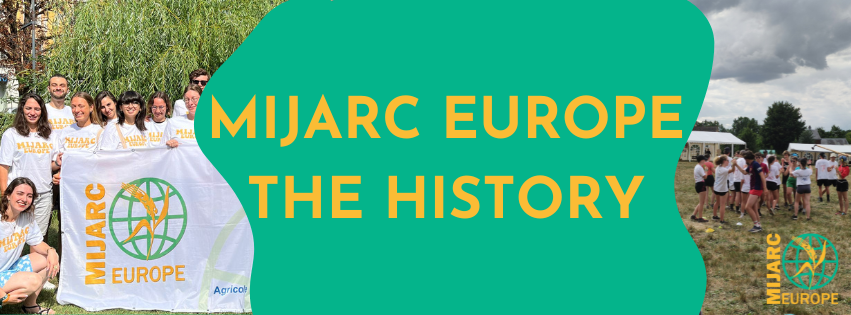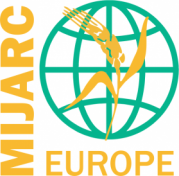
the context
Catholic Rural Youth Movements existed already before World War II. However, it is only after WWII, that became clear how important it was to connect the rural youth coming from different countries so to build up an international understanding. Wanting to build up a world with greater social and economic justice, the movements of Flanders – Wallonia, Frances, Netherlands, Luxembourg, Italy, Germany, Portugal, Switzerland, and Austria came together to establish the International Catholic Movement for Rural and Agricultural Youth or “Mouvement International de la Jeunesse Agricole et Rurale Catholique” in its French name, also called with the acronym of MIJARC.
The same goal guided the establishment of MIJARC’s bodies and look-alike organisations at various global levels so to represent the Rural and Agricultural youth at a much larger scale.
The ’60s and the ‘70s
MIJARC Europe focused on a new set of priorities in line with the fast-paced institutional evolutions of the decade in Europe. For that reason, the main topics tackled were the creation of the European Economic Community (EEC) in 1957, the market unification, and, as a consequence the migration policies of that period.
A very brightest historical moment was enjoyed by MIJARC Europe when, in 1965, it brought together more than 20.000 young people, from all over Europe, for the European Festival in Stuttgart (Germany).
The ’80s
The evolving European social and political landscape pushed MIJARC Europe and its most active members to adopt a new set of priorities. Subjects such as women’s status in rural areas, international solidarity, GMOs, Europe and its future were discussed in seminars, trainings and other events organized by MIJARC.
The ’90s
Following the fall of the Berlin Wall, of the Iron Curtain and of the Sovietic Block, MIJARC’s gaze moved eastward. Contacts were established with groups, movements and rural youth organisations based in Poland, Hungary, Slovenia and Latvia. For this purpose, MIJARC created a special East-West Working Group and developed several bilateral partnerships to test starting collaborations.
Also, in this decade, it was decided that MIJARC Europe set a statutory separation from MIJARC World, eventually becoming an independent and juridical autonomous organisation on 28/11/1996, when it was reregistered at Moniteur Belge.
The 2000s
Two European partnerships of MIJARC [the one with the European Youth Forum (YFJ) and the one European Coordination La Via Campesina (ECVC)] resulted in a boost of MIJARC’s engagement at international level.
For making the rural youngsters’ voices heard, in 2005 MIJARC Europe partnered Rural Youth Europe (RYE) in a pilot project of the European Commission. The two Youth consortia, representing Rural Youth Organizations from more than 30 countries, accounted for more than 700.000 young people.
Awareness and critical discussions were revitalised this way, although the European Rural Youth still struggled to see its viewpoint take into account in the EU policy process, concerning Agricultural and Rural policies. Notwithstanding, MIJARC kept its European Spirit high, campaigning for the EU Parliamentary elections.
2010-2020
Focussing strongly on external representation, MIJARC Europe has kept expanding its working contacts, getting to work with Armenian, Romanian and Maltese Youth organisations and also gaining a wealth of experience about how associationism is lived out in Eastern and Western Europe.
MIJARC Europe has also started working on Key-Actions 1 and Key-Actions 3 of the first programming period of Erasmus+ and it reconfirms itself as a solid partner for the European Youth Foundation of the Council of Europe. This means that MIJARC has been engaged in offering to European youngsters learning opportunities abroad and support for the organisation development of their youth activism and advocacy.
THE LAST YEARS
Covid-19 outbreak heavily impacted the whole youth work field. After the initial hit, MIJARC Europe managed to move its activities online, allowing the organization to keep running despite the challenging period.
In the meanwhile, under the guidance of the Christliche Initiative Romero (CIR), and together with other 15 civil society organizations, MIJARC Europe engaged in the project OUR FOOD OUR FUTURE. Mainly sponsored by the European Commission in the framework of the DEAR Programme, MIJARC took part into this project to promote, advocate and campaign for a sustainable food system, which is human rights-based and agroecological.
Simultaneously, thanks to the relaxation of the covid-19 related restrictions, MIJARC Europe was able to organize several in-person activities, aiming at fostering active civic participation of young citizens living in rural areas while promoting equality and inclusivity.
Do you want to know more about the current projects and upcoming opportunities? Follow us on Instagram and Facebook
